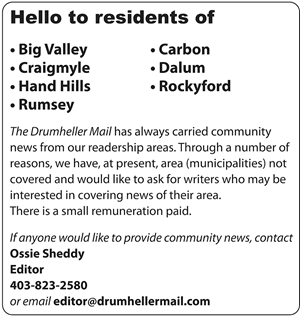
As 2019 begins, the Special Areas Board is hard at work getting ready for the busy year ahead. Some key initiatives for the first part of the year include policy work related to public lands, economic development and business retention tools, road committee meetings and intermunicipal collaboration.
Much of the planned work in 2019 is a direct result of direction from the Special Areas Advisory Council. New committees comprised of Advisory Councillors and administrative staff were struck in December to investigate and develop specific policies for the Advisory Council as a whole to review. Over the next few months, these committees will be working on policies for community pastures, abandoned railways, and business investment and retention. In addition to these new committees, Administration will be developing materials to help Advisory Council review the cultivation lease policy at the next Advisory Council meeting planned for this spring.
Recommended by the Advisory Council as a part of the 2019 road program, Special Areas planning to pilot a shoulder pull program over the 2019 construction season. Designed to rehabilitate gravel roadways by re-establishing crown and appropriate surface width, this program should reduce long-term maintenance and expensive reconstruction costs. For the pilot year, the shoulder pull program will be executed both by in-house Special Areas forces and by an external contractor, allowing Administration and Advisory Council to directly compare costs, performance, and overall quality of the final product. This new program, along with the 2019 proposed road program, is being discussed by road committees throughout the Special Areas over the next few weeks. The final 2019 road program will be presented to Advisory Council at the spring meeting for approval. Some recent changes to provincial legislation are also driving part of the work in 2019. Intermunicipal collaboration frameworks and development plans are needed for the Special Areas Board and our municipal neighbours; in all, this means more than 15 different frameworks to develop. The Emergency Management Amendment Act, which came into force in November 2018, has meant changes to emergency management planning and documents for municipalities, including updating emergency plans, training, and regional collaboration. This work will continue over the next year, with stakeholder engagement and consultation planned throughout the process.
The next meeting of the Special Areas Advisory Council is planned for April 4 & 5, 2019. The Special Areas Board meets bi-monthly throughout the Special Areas.
















